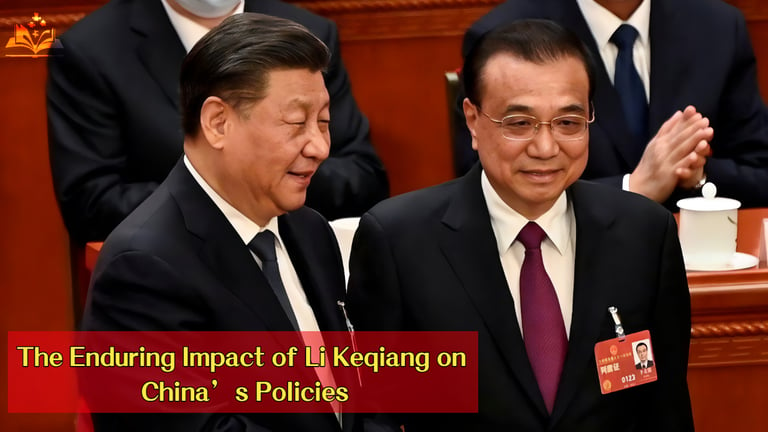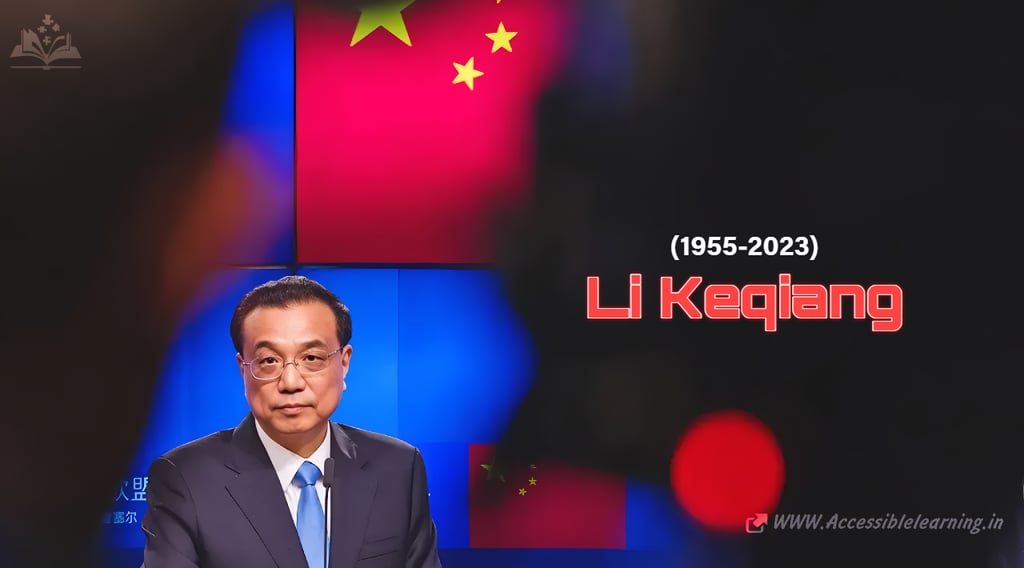
Li Keqiang: Architect of Modern China's Economic Resilience!
Discover the life, leadership, and legacy of Li Keqiang, the former Premier of China, known for his economic reforms, environmental initiatives, and contributions to modernizing China's governance during a transformative era.
CHINABIOGRAPHYPOLITICAL JOURNEYEDUCATION/KNOWLEDGETHE GREAT LEADER
Kim Shin
12/31/20245 min read
Li Keqiang 李克強, one of the most prominent figures in contemporary Chinese politics, served as the Premier of the People's Republic of China from 2013 to 2023. Known for his pragmatic approach to economic reforms and governance, Li played a pivotal role in shaping China's trajectory during a period marked by rapid economic growth, technological advancements, and complex global challenges. This article delves into Li Keqiang’s life, political career, and contributions, reflecting on his legacy as a leader who prioritized development, innovation, and the welfare of his people.
Early Life and Education: Foundations of Leadership!
Li Keqiang was born on July 1, 1955, in Dingyuan County, Anhui Province, China, into a modest family. His upbringing in a rural area profoundly influenced his perspective on governance and his commitment to improving the lives of ordinary citizens.
Li's academic journey was marked by excellence and intellectual curiosity. He attended Peking University, one of China’s most prestigious institutions, where he earned a degree in law and later pursued a doctorate in economics. His thesis, focusing on macroeconomic theory, showcased his analytical rigor and laid the groundwork for his future role as a policymaker. This combination of legal and economic expertise equipped Li with a unique lens to address the complexities of governance in a rapidly modernizing nation.
During his university years, Li was also actively involved in student politics, which gave him early exposure to leadership and public service. His experiences during this period shaped his belief in the importance of intellectual discourse and critical thinking in governance.
Rise in Politics: A Steady Ascent!
Li Keqiang’s political career began in the Communist Youth League of China (CYLC), where he quickly rose through the ranks. His association with Hu Jintao, a former Chinese president and CYLC leader, proved instrumental in shaping his political trajectory. Li’s leadership skills and policy acumen were evident during his tenure as the CYLC’s First Secretary from 1993 to 1998.
In the late 1990s, Li transitioned to provincial leadership roles, serving as the governor of Henan Province and later as Party Secretary of Liaoning Province. These roles provided him with valuable administrative experience and a deep understanding of regional challenges, including economic disparities, public health crises, and environmental issues. For instance, during his time in Henan, Li dealt with the fallout of a major HIV/AIDS scandal linked to illegal blood selling—a challenge that tested his crisis management abilities.
While in Liaoning, Li focused on revitalizing the region’s traditional industries, such as steel and heavy manufacturing, while promoting innovation and modernizing its economic base. His efforts contributed to improved industrial output and employment opportunities in the region.
Premier of China: Championing Economic Reforms!
Li Keqiang assumed the office of premier in March 2013, succeeding Wen Jiabao. As the head of the State Council, Li was tasked with overseeing China's economic policies, social development, and government administration. His tenure coincided with a crucial phase in China’s development, characterized by slowing economic growth, mounting global scrutiny, and increasing domestic demands for reform.
Key Initiatives & Achievements!
Economic Modernization
Li introduced the "Likonomics" framework, emphasizing three pillars: structural reforms, deleveraging, and minimal reliance on stimulus measures. This approach aimed to steer China toward a more sustainable and innovation-driven economy.
He prioritized cutting red tape, fostering entrepreneurship, and encouraging private-sector participation, which contributed to the growth of small and medium-sized enterprises (SMEs).
Under his leadership, China’s economy transitioned from an investment-led model to one driven by consumption and services, reflecting his focus on long-term resilience.
Focus on Innovation
Recognizing the importance of technology, Li championed initiatives to bolster China’s role in the global tech ecosystem. Programs like "Internet Plus" integrated digital technologies with traditional industries, driving efficiency and innovation.
He supported the development of high-tech zones, start-up incubators, and research institutions, laying the groundwork for advancements in artificial intelligence, renewable energy, and biotechnology.
Li also played a significant role in China’s ambitious space exploration program, emphasizing its importance as a driver of technological and national prestige.
Environmental & Social Policies!
Li advocated for balancing economic growth with environmental sustainability. His policies included stricter regulations on industrial pollution, investments in renewable energy, and initiatives to combat urban smog.
He also addressed issues like poverty alleviation and healthcare reform, ensuring that the benefits of China’s growth were more equitably distributed. His push for affordable housing and social welfare programs reflected his commitment to improving living standards.
Li’s government launched significant reforestation campaigns and introduced green finance mechanisms to support environmentally friendly projects.
International Relations
Li played a key role in expanding China’s global influence through trade and diplomacy. He was instrumental in advancing the Belt and Road Initiative and fostering economic partnerships across Asia, Africa, and Europe.
As a skilled negotiator, Li represented China in key international forums, advocating for multilateralism and economic globalization.
His visits to various countries, including those in Europe and Southeast Asia, underscored his focus on fostering bilateral trade relations and investment.


Leadership Style: The People’s Premier!
Li Keqiang earned the reputation of being a pragmatic and approachable leader. Known for his straightforward communication style, he often engaged directly with citizens during field visits, earning him the nickname "The People’s Premier." His focus on transparency and accountability resonated with many, as he sought to address the concerns of ordinary Chinese people. During his visits to factories, farms, and disaster-hit areas, Li’s hands-on approach reflected his belief in understanding the realities on the ground.
Li was also a strong advocate for open dialogue with economists, scientists, and foreign experts, believing that diverse perspectives could enhance policymaking. His efforts to make government policies more transparent and accessible further cemented his reputation as a reformist.
Challenges & Criticism!
Despite his achievements, Li’s tenure was not without challenges. Slowing GDP growth, rising debt levels, and the COVID-19 pandemic tested his leadership. Critics argued that his reform agenda faced resistance from entrenched interests, limiting its impact. Additionally, his role was sometimes overshadowed by the growing centralization of power under President Xi Jinping.
Li also faced criticism for the uneven implementation of environmental and social policies, with some regions lagging behind national goals. Nevertheless, his persistence in addressing these issues underscored his commitment to long-term progress.
The COVID-19 pandemic posed unprecedented challenges, and Li played a central role in coordinating China’s economic recovery efforts. His government’s focus on stabilizing supply chains, supporting small businesses, and rolling out fiscal stimulus packages showcased his ability to navigate crises.
Legacy
Li Keqiang’s legacy lies in his unwavering commitment to economic modernization, social equity, and environmental sustainability. His policies reflected a deep understanding of China’s evolving challenges and opportunities, emphasizing long-term resilience over short-term gains. As a leader, Li balanced pragmatism with empathy, leaving an indelible mark on China’s development journey.
Although Li stepped down as Premier in 2023, his contributions to China’s governance and growth continue to influence the nation’s trajectory. His life serves as a testament to the power of intellect, perseverance, and a genuine commitment to public service. Li Keqiang will be remembered as a leader who navigated complex domestic and international landscapes with vision, humility, and a steadfast dedication to improving the lives of his people.


Subscribe To Our Newsletter
All © Copyright reserved by Accessible-Learning Hub
| Terms & Conditions
Knowledge is power. Learn with Us. 📚


